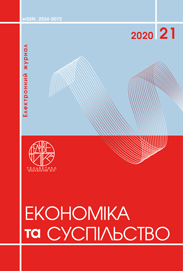CHALLENGES FOR ECONOMICS UKRAINE IN CONDITIONS OF EUROPEAN INTEGRATION
Abstract
The article analyzes the current conditions of economic development in Ukraine. The challenges of the economy during the period of European integration are systematized: protection of the territorial integrity of the country; provision of economic and information security; development of industries using modern technologies; raising standards of living quality of the population; introduction of environmental safety measures. The paper proposes a systematic approach to the implementation of the basic goal of the state. The factors of improvement of the investment climate are investigated: implementation of a complex of environmental protection agro-technical, reclamation, hydro technical and organizational measures; social orientation of state policy; development of production potential; reducing the outflow of labor and improving working conditions; development of the country’s infrastructure; social orientation of the institutional system; improvement of social protection. Based on the properties of dynamic systems, the development directions of society and the necessary conditions for success are structured. Analysis of the properties of society as a dynamic system according to the theory of chaos allows you to choose the best projects for launching a systematic approach in managing the development of the economy of the country. The paper analyzes the project of renewal of heating networks in the country. This project will make it possible to combine various subsystems of management in a complex structure and introduce a system development mechanism. Four algorithms have been analyzed for implementation of the country’s rapid development programs: attempts and errors; influence on basic subsystems; worked out by successful countries; crypto algorithms. By the criterion of the number of attempts to obtain a result in the light of randomness, it is proposed to choose an algorithm for the influence on the development of the basic vectors – subsystems (processing and permanent fixing of the results). On the basis of the theory of complexity, the best algorithm of public administration is proposed, which is based on professional competencies, namely, skills for working with strategic information. The conditions for the success of a systematic approach to managing the development of a country are the active participation of the media in the awareness by voters of the criteria for selecting government managers and monitoring important results of their work.
References
Сисоєв Є. Стратегічний національний проект «Інноваційна Україна». URL: http://www.slideshare.net/YevgenSysoyev/ss-32717561.
Guidelines on regional State aid for 2014–2020. URL: http://eur-lex.europa.eu/legalcontent/EN/TXT/?uri=CELEX:52013XC0723(03).
Сайт Державної служби статистики України. URL: http://www.ukrstat.gov.ua.
Сайт світового економічного форуму. URL: http://www.weforum.org.
Сімків Л., Потьомкіна Н. Особливості залучення іноземних інвестицій в регіонах України. Розвиток продуктивних сил і регіональна економіка. 2017. Вип. 15. С. 404–408.
Readiness for the Future of Production Report 2018. URL: http://www3.weforum.org/docs/FOP_Readiness_Report_2018.pdf.
Норт Д. Вклад неоинституционализма в понимание проблем переходной экономики. URL: https://www.twirpx.com/file/430064.
Стиглиц Дж. Цена неравенства. Чем расслоение общества грозит нашому будущему. Москва : Эксмо, 2015. 512 с.
Кругман П. Выход из кризиса есть / пер. с англ. Ю. Гольдберга. Москва : Азбука Бизнес, Азбука Аттикус, 2013. 320 с.
Імплементація Угоди про асоціацію між Україною та ЄС: економічні виклики та нові можливості : наукова доповідь / за ред. В. Гейця, Т. Осташко. Київ : Інститут екон. та прогнозув. НАН України, 2016. 184 с. URL: http://ief.org.ua/?p=6246.
Малинецкий Г., Потапов А., Подлазов А. Нелинейная динамика: подходы, результаты, надежды. Москва : Стереотип, 2016. 280 с.
Петерс Э. Хаос и порядок на рынках капитала. Москва : Мир, 2000. 305 с.
Талеб Н.Н. Антихрупкость. Как извлечь выгоду из хаоса. Москва : Азбука ; КоЛибри. 2015. 768 с.
Сколько получают депутаты стран Евросоюза. 2016. URL: https://delo.ua/econonomyandpoliticsinukraine/skolko-poluchajut-deputaty-stran-evrosojuza-315327.
Колодізєв О. Формування багаторівневої системи показників фінансування інноваційної діяльності. Актуальні проблеми економіки. 2013. № 8. С. 32–44. URL: http://nbuv.gov.ua/j-pdf/ape_2013_8_5.pdf.
The Black Swan: The Impact of the Highly Improbable / by N.N. Taleb. The New York Times. 2017. April 22.
:
Sysojev Je. Strateghichnyj nacionaljnyj proekt “Innovacijna Ukrajina” [Strategic national project “Innovation Ukraine”]. http://www.slideshare.net/YevgenSysoyev/ss-32717561.
Guidelines on regional State aid for 2014–2020. http://eur-lex.europa.eu/legalcontent/EN/TXT/?uri=CELEX:52013XC0723(03).
The site of the State Statistics Service of Ukraine (2018). http://www.ukrstat.gov.ua.
Website of the World Economic Forum (2019). http://www.weforum.org.
Simkiv L., Potjomkina N. (2017) Osoblyvosti zaluchennja inozemnykh investycij v reghionakh Ukrajiny [Features of attraction foreign investments in the regions of Ukraine] // Development of Productive Forces and Regional Economics. No. 15. P. 404–408.
Readiness for the Future of Production Report 2018. http://www3.weforum.org/docs/FOP_Readiness_Report_2018.pdf.
Nort D. Vklad neoinstitutsionalizma v ponimanie problem perekhodnoy ekonomiki [The contribution of neo-institutionalism to understanding the problems of the transition economy]. https://www.twirpx.com/file/430064.
Stiglits Dzh. (2015) Tsena neravenstva. Chem rassloenie obshchestva grozit nashomu budushchemu [The price of inequality. Than the stratification of society threatens our future]. Moscow : Eksmo (in Russian).
Krugman P. (2013) Vykhod iz krizisa est’. [The way out of the crisis is]. Moscow : Azbuka Biznes ; Azbuka Attikus (in Russian).
Ghejjecj V., Ostashko T. (2016) Implementacija Ughody pro asociaciju mizh Ukrajinoju ta JeS: ekonomichni vyklyky ta novi mozhlyvosti [Implementation of the Association Agreement between Ukraine and the EU: Economic Challenges and New Opportunities]. Instytut ekonomiky ta proghnozuvannja NAN Ukrajiny. (Ukrajina, Kyjiv, 2016). P. 1–184. http://ief.org.ua/?p=6246.
Malinetskiy G., Potapov A., Podlazov A. (2016) Nelineynaya dinamika: podkhody, rezul’taty, nadezhdy [Nonlinear dynamics: Approaches, results, hopes]. Moscow : Stereotip (in Russian).
Peters E. (2000) Khaos i poryadok na rynkakh kapitala [Chaos and order in the capital markets]. Moscow : Mir (in Russian).
Taleb N.N. (2015) Antikhrupkost’. Kak izvlech’ vygodu iz khaosa [Anti-fragility. How to benefit from chaos]. Moscow : Azbuka ; KoLibri (in Russian).
Skol’ko poluchayut deputaty stran Evrosoyuza [How many members of the European Union get]. (2016). https://delo.ua/econonomyandpoliticsinukraine/skolko-poluchajut-deputaty-stran-evrosojuza-315327.
Kolodizjev O. (2013) Formuvannja baghatorivnevoji systemy pokaznykiv finansuvannja innovacijnoji dijaljnosti [Formation of the multilevel system of indicators of financing of innovation activity]. Actual problems of the economy. No. 8. P. 32–44. http://nbuv.gov.ua/j-pdf/ape_2013_8_5.pdf.
Taleb N.N. (2007) The Black Swan: The Impact of the Highly Improbable, The New York Times, April 22.


